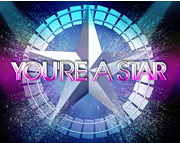
Sarit Hadad is an Israeli singer. She was named by Channel 24 as the "best female singer of the 2000s" in October 2009. She represented Israel with the song "Light a Candle" at the Eurovision Song Contest 2002 in Tallinn, Estonia.

"Love Shine a Light" is a song by British rock band Katrina and the Waves written by Kimberley Rew. It represented the United Kingdom in the Eurovision Song Contest 1997 held in Dublin, resulting in the country's fifth and most recent win at the contest. It was released as a single on 28 April 1997 and later included on the band's ninth studio album, Walk on Water (1997), serving as the album's lead single.

Pearl Lavinia Carr and Edward Victor "Teddy" Johnson were English husband-and-wife entertainers who were best-known during the 1950s and early 1960s. They were the UK's Eurovision entrants at the 1959 contest with "Sing, Little Birdie", which came second.

Donald Smith Airey is an English musician who has been the keyboardist in the rock band Deep Purple since 2002, after the retirement of Jon Lord. He has had a long and productive career, playing with such acts as Gary Moore, Ozzy Osbourne, Judas Priest, Black Sabbath, Jethro Tull, Whitesnake, Saxon, Wishbone Ash, Colosseum II, Ten, Sinner, Michael Schenker, Rainbow, Empire, Brian May, Divlje jagode and Living Loud. He has also worked with Andrew Lloyd Webber.

You're a Star is an Irish music competition series broadcast by RTÉ One from 2002 to 2008. Produced by the broadcaster and Screentime ShinAwiL, the series was similar to formats such as Idol and The X Factor.

Niamh Kavanagh is an Irish singer who sang the winning entry at the Eurovision Song Contest 1993.
Fabrizio Faniello is a Maltese pop singer. He represented Malta at the Eurovision Song Contest in 2001 and 2006.

Ireland has participated in the Eurovision Song Contest 57 times since making its debut at the 1965 contest in Naples, missing only two contests since, in 1983 and 2002. The current Irish participant broadcaster in the contest is Raidió Teilifís Éireann (RTÉ). Ireland shares a joint record total of seven wins with Sweden, and is the only country to have won three times consecutively. Ireland has finished second four times, while Sweden has done that just once.

Brian Edward Patrick Kennedy is an Irish singer. He scored a number of hit singles and albums in the UK and Ireland during the 1990s and 2000s. He represented Ireland in the Eurovision Song Contest 2006 and finished in 10th place. Brian is the younger brother of musician Bap Kennedy.
André Sergeyi Hovnanyan, better known by the mononym André, is an Armenian singer. He was one of the most popular pop stars of Armenia during the mid-2000s, winning the Best Male Singer trophy at various Armenia Music Awards in 2004–2018.

"Rock 'n' Roll Kids" is a song recorded by Paul Harrington and Charlie McGettigan written by Brendan Graham. It represented Ireland in the Eurovision Song Contest 1994 held in Dublin, resulting an unprecedented third consecutive time that the same country had won the contest, being Ireland's sixth overall win.

"Every Song is a Cry for Love" was the Irish entry in the Eurovision Song Contest 2006, written and performed by Brian Kennedy in English.
Ireland was represented at the Eurovision Song Contest 2001 with the song "Without Your Love", written by Pat Sheridan, and performed by Gary O'Shaughnessy. The Irish participating broadcaster, Radio Telefís Éireann (RTÉ), organised the national final Eurosong 2001 in order to select its entry for the contest. Seven songs faced a regional televote, ultimately resulting in the selection of "Without Your Love" performed by Gary O'Shaughnessy as the Irish Eurovision entry.
Ireland was represented at the Eurovision Song Contest 2003 with the song "We've Got the World", written by Martin Brannigan and Keith Molloy, and performed by Mickey Joe Harte. The Irish participating broadcaster, Radio Telefís Éireann (RTÉ), organised the competition You're a Star in order to select its entry for the contest. The broadcaster returned to the contest after a one-year absence following their relegation in 2002 as one of the bottom six entrants in 2001. The competition consisted of 20 shows and concluded with a final, resulting in the selection of "We've Got the World" performed by Mickey Joe Harte as the Irish Eurovision entry after facing a public televote.
"Dile que la quiero" is a song recorded by Spanish singer David Civera, written by Alejandro Abad. It represented Spain in the Eurovision Song Contest 2001, held in Copenhagen.
Without Your Love may refer to:

Ryan O'Shaughnessy is an Irish singer and former actor from Loughshinny, Skerries, Dublin. He portrayed Mark Halpin in the popular TV series Fair City for nine years (2001–2010). In January 2012, he appeared in the inaugurative season of The Voice of Ireland and in May 2012, he took part in sixth series of Britain's Got Talent making it to the final and finishing in fifth place. He represented Ireland in the Eurovision Song Contest 2018 with the song "Together" finishing 16th.

Gianluca Bezzina is a Maltese medical doctor and part-time singer who represented Malta in the Eurovision Song Contest 2013 in Malmö, Sweden.
Ireland participated in the Eurovision Song Contest 2018 with the song "Together", sung by Ryan O'Shaughnessy and written by O'Shaughnessy, Mark Caplice and Laura Elizabeth Hughes. The Irish song and the singer for the 2018 contest in Lisbon, Portugal were internally selected by the Irish broadcaster Raidió Teilifís Éireann (RTÉ). O'Shaughnessy's internal selection was announced on 31 January 2018, while "Together" was presented on 9 March 2018.

"Together" is a song by Irish singer Ryan O'Shaughnessy. The song represented Ireland in the Eurovision Song Contest 2018. The song title was revealed to the public on 31 January 2018, and was composed by O'Shaughnessy as part of a team of The Nucleus writers and produced by Mark McCabe.












